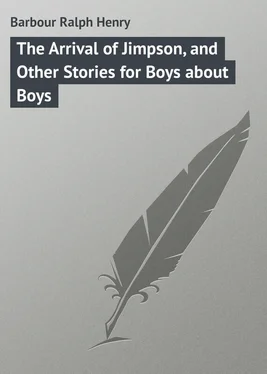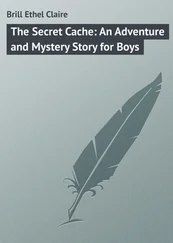Ralph Barbour - The Arrival of Jimpson, and Other Stories for Boys about Boys
Здесь есть возможность читать онлайн «Ralph Barbour - The Arrival of Jimpson, and Other Stories for Boys about Boys» — ознакомительный отрывок электронной книги совершенно бесплатно, а после прочтения отрывка купить полную версию. В некоторых случаях можно слушать аудио, скачать через торрент в формате fb2 и присутствует краткое содержание. ISBN: , Жанр: foreign_prose, foreign_children, на английском языке. Описание произведения, (предисловие) а так же отзывы посетителей доступны на портале библиотеки ЛибКат.
- Название:The Arrival of Jimpson, and Other Stories for Boys about Boys
- Автор:
- Жанр:
- Год:неизвестен
- ISBN:http://www.gutenberg.org/ebooks/45689
- Рейтинг книги:3 / 5. Голосов: 1
-
Избранное:Добавить в избранное
- Отзывы:
-
Ваша оценка:
- 60
- 1
- 2
- 3
- 4
- 5
The Arrival of Jimpson, and Other Stories for Boys about Boys: краткое содержание, описание и аннотация
Предлагаем к чтению аннотацию, описание, краткое содержание или предисловие (зависит от того, что написал сам автор книги «The Arrival of Jimpson, and Other Stories for Boys about Boys»). Если вы не нашли необходимую информацию о книге — напишите в комментариях, мы постараемся отыскать её.
The Arrival of Jimpson, and Other Stories for Boys about Boys — читать онлайн ознакомительный отрывок
Ниже представлен текст книги, разбитый по страницам. Система сохранения места последней прочитанной страницы, позволяет с удобством читать онлайн бесплатно книгу «The Arrival of Jimpson, and Other Stories for Boys about Boys», без необходимости каждый раз заново искать на чём Вы остановились. Поставьте закладку, и сможете в любой момент перейти на страницу, на которой закончили чтение.
Интервал:
Закладка:
Vulcan was a good way off – as Marty viewed distance – and the fare for the round trip was $1.40, just $1.28 more than Marty possessed. He had hinted to Bob Ayer and to “Herb” Webster, the club’s manager, the real need of taking him along – had even been gloomy and foretold a harrowing defeat for their nine in the event of his absence from the scene. But Summerville’s finances were at low ebb, and, owing to the sickness of one good player and the absence of another, her hopes of capturing the one-hundred-dollar purse which was yearly put up by the citizens of the rival towns were but slight. So Marty was to be left behind. And that was why Marty sat on the packing-case and grieved, refusing to join in the lively sport of his friends who, farther up the street, were firing off a small brass cannon in front of Hurlbert’s hardware store.
Already, by ones and twos, the Vulcan-bound citizens were toiling through the hot sun toward the station. Marty watched them, and scowled darkly. For the time he was a radical socialist, and railed silently at the unjust manner in which riches are distributed. Presently a group of five fellows, whose ages varied from seventeen to twenty-one, came into sight upon the main street. They wore gray uniforms, with blue and white stockings and caps of the same hues, and on their breasts were big blue S’s. Two of them carried, swung between them, a long leather bag containing Marty’s charge, the club’s bats. The players spied the boy on the box, and hailed him from across the street. Marty’s reply was low-toned and despondent. But after they had turned the corner toward the station, he settled his cap firmly on his head and, sliding off the box, hurried after them.
The station platform was well filled when he gained it. Bob Ayer was talking excitedly to Joe Sleeper, and Marty, listening from a distance, gathered that Magee, the Summerville center-fielder, had not put in his appearance.
“If he fails us,” Bob was saying anxiously, “it’s all up before we start. We’re crippled already. Has any one seen him?”
None had, and Bob, looking more worried than before, strode off through the crowd to seek for news. Of course, Marty told himself, he didn’t want Summerville to lose, but, just the same, if they did, it would serve them right for not taking him along. A long whistle in the distance sounded, and Bob came back, shaking his head in despair.
“Not here,” he said.
A murmur of dismay went up from the group, and Marty slid off the baggage-truck and approached the captain.
“Say, let me go along, won’t yer, Bob?”
Bob turned, and, seeing Marty’s eager face, forgot his worry for the moment, and asked kindly: “Can you buy your ticket?”
“No.” Marty clenched his hands and looked desperately from one to another of the group. The train was thundering down the track beside the platform. “But you fellows might buy me one. And I’d pay yer back, honest!”
“Say, Bob, let’s take him,” said Hamilton. “Goodness knows, if we ever needed a mascot, we need one to-day! Here, I’ll chip in a quarter.”
“So’ll I,” said Sleeper. “Marty ought to go along; that’s a fact.”
“Here’s another.” “You pay for me, Dick, and I’ll settle with you when we get back.” “I’ll give a quarter, too.”
“All aboard!” shouted the conductor.
“All right, Marty; jump on,” cried Bob. “We’ll find the money – though I don’t know where your dinner’s coming from!”
Marty was up the car-steps before Bob had finished speaking, and was hauling the long bag from Wolcott with eager hands. Then they trooped into the smoking-car, since the day-coaches were already full, and Marty sat down on the stiff leather seat and stood the bag beside him. The train pulled out of the little station, and Marty’s gloom gave place to radiant joy.
The journey to Vulcan occupied three-quarters of an hour, during which time Bob and the other eight groaned over the absence of Magee and Curtis and Goodman, predicted defeat in one breath and hoped for victory in the next, and rearranged the batting list in eleven different ways before they were at last satisfied. Marty meanwhile, with his scuffed shoes resting on the opposite seat, one brown hand laid importantly upon the leather bag and his face wreathed in smiles, kept his blue eyes fixedly upon the summer landscape that slid by the open window. It was his first railway trip of any length, and it was very wonderful and exciting. Even the knowledge that defeat was the probable fate ahead of the expedition failed to more than tinge his pleasure with regret.
At Vulcan the train ran under a long iron-roofed structure, noisy with the puffing of engines, the voices of the many that thronged the platforms, and the clanging of a brazen gong announcing dinner in the station restaurant. Marty was awed but delighted. He carried one end of the big bag across the street to the hotel, his eager eyes staring hither and thither in wide amaze. Vulcan boasted of a big bridge-works and steel-mills, and put on many of the airs of a larger city. Bob told Marty that they had arranged for his dinner in the hotel dining-room, but the latter demurred on the score of expense.
“Yer see, I want ter pay yer back, Bob, and so I guess I don’t want ter go seventy-five cents fer dinner. Why, that’s more’n what three dinners costs us at home. I’ll just go out and get a bit of lunch, I guess. Would yer lend me ten cents?”
Marty enjoyed himself thoroughly during the succeeding half-hour: He bought a five-cent bag of peanuts and three bananas, and aided digestion by strolling about the streets while he consumed them, at last finding his way to the first of the wonderful steel-mills and wandering about freely among the bewildering cranes, rollers, and other ponderous machines. He wished it was not the Fourth of July; he would like to have seen things at work. Finally, red-faced and perspiring, he hurried back to the hotel and entered a coach with the others, and was driven through the city to the ball-ground. This had a high board fence about it, and long tiers of seats half encircling the field. There were lots of persons there, and others were arriving every minute. Marty followed the nine into a little dressing-room built under the grand stand, and presently followed them out again to a bench in the shade just to the left of the home plate. Here he unstrapped his bag and arranged the bats on the ground, examining them carefully, greatly impressed with his own importance.
The Vulcans, who had been practising on the diamond, trotted in, and Bob and the others took their places. The home team wore gray costumes with maroon stockings and caps, and the big V that adorned the shirts was also maroon. Many of them were workers in the steel-mills, and to Marty they seemed rather older than the Summervilles. Then the umpire, a very small man in a snuff-colored alpaca coat and cap, made his appearance, and the men at practise came in. The umpire tossed a coin between Bob and the Vulcans’ captain, and Bob won with “heads!” and led his players into the field. A lot of men just back of Marty began to cheer for the home team as Vulcan’s first man went to bat.
It were sorry work to write in detail of the disastrous first seven innings of that game. Summerville’s hope of taking the one-hundred-dollar purse home with them languished and dwindled, and finally faded quite away when, in the first half of the seventh inning, Vulcan found Warner’s delivery and batted the ball into every quarter of the field, and ran their score up to twelve. Summerville went to bat in the last half plainly discouraged. Oliver struck out. Hamilton hit to second base and was thrown out. Pickering got first on balls, but “died” there on a well-fielded fly of Warner’s.
Читать дальшеИнтервал:
Закладка:
Похожие книги на «The Arrival of Jimpson, and Other Stories for Boys about Boys»
Представляем Вашему вниманию похожие книги на «The Arrival of Jimpson, and Other Stories for Boys about Boys» списком для выбора. Мы отобрали схожую по названию и смыслу литературу в надежде предоставить читателям больше вариантов отыскать новые, интересные, ещё непрочитанные произведения.
Обсуждение, отзывы о книге «The Arrival of Jimpson, and Other Stories for Boys about Boys» и просто собственные мнения читателей. Оставьте ваши комментарии, напишите, что Вы думаете о произведении, его смысле или главных героях. Укажите что конкретно понравилось, а что нет, и почему Вы так считаете.












